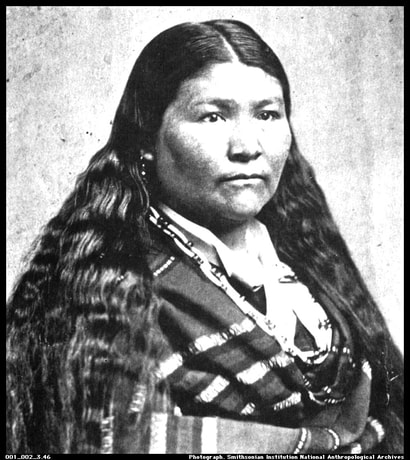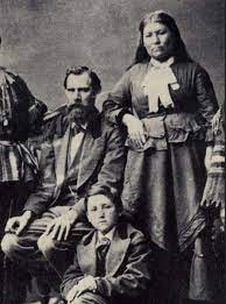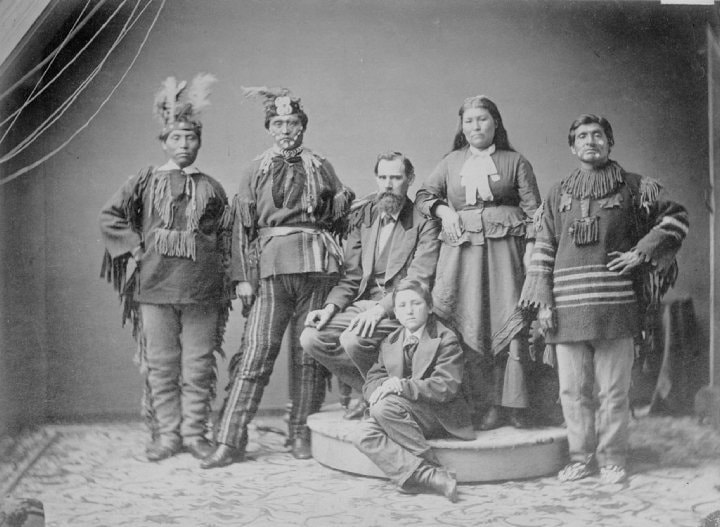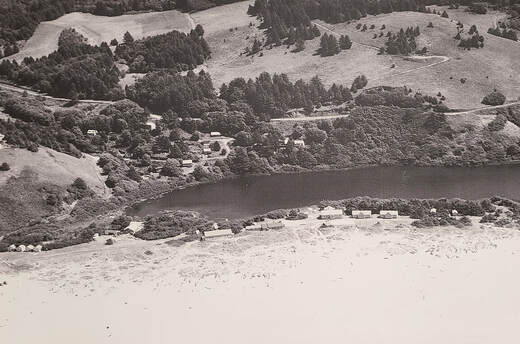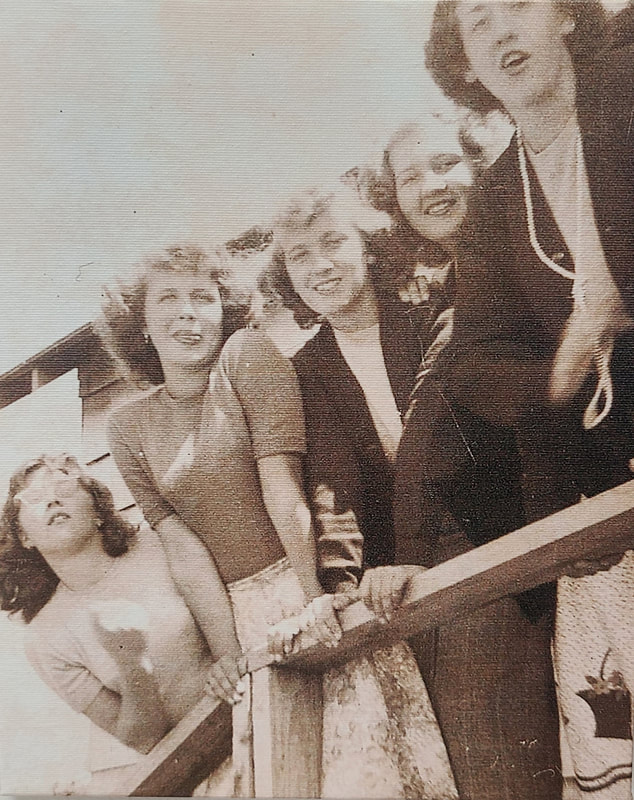OUR NAMESAKE - WI-NE-MA
|
On February 25, 1891, Congress passed piece of legislation that awarded Wi Ne Ma Riddle a pension at the rate of twenty-five dollars per month for courage in battle. While this was not uncommon in any way, there was something about this particular legislation that set it apart from others: Wi Ne Ma Riddle was a Native American woman of the Modoc tribe.
Who was this brave woman, and how did our camp get her name? It began in 1848, when a child with red tinted hair was born to the Modoc Native American tribe. Red hair being a rarity among the Modoc, she was named “Nannookdoowah”, meaning “Strange Child”. In her youth, Nannookdoowah rescued a group of her friends who were caught in river rapids while canoeing. From that day forward, she was called “Woman Chief”, or “Wi Ne Ma” in the Modoc tongue. She would continue in her bravery as she grew older, and even rode with raiding parties of men to gather horses from enemy Native American camps. |
|
As a young woman, Wi Ne Ma fell in love with Frank Riddle, a white man who came to the area searching for gold. Although her family had arranged for her to marry a man within the tribe (the Modoc tradition), Wi Ne Ma dissented and married Frank, despite her family’s wishes.
Frank, in an effort to ease any tension with his new in-laws, followed Modoc tradition and gifted his father-in-law six horses in exchange for his marriage to Wi Ne Ma. Frank and Wi Ne Ma settled near the Lost River area, where they had a son, who they named Charka, “the handsome one”. Through their marriage, Frank introduced Wi Ne Ma to Christianity, and she accepted Christ as her Savior. |
Wi Ne Ma and Frank learned each other’s languages, and they became mediators between the Modoc and settlers in the area. Wi Ne Ma even took a name more familiar to the settlers, “Toby”, and you may see her cited as “Toby Riddle” in some places.
When tensions began to rise between the native tribes and the incoming settlers, violent acts began to break out. This led to a war between the Modoc and the US Government, now called “The Modoc War”. Wi Ne Ma and Frank Riddle were commissioned as interpreters, and they helped facilitate many peace talks.
During one talk in particular, General Canby, Alfred B. Meacham, Rev. E. Thomas, and L. S. Dyar, brought Frank and Wi Ne Ma Riddle as interpreters to help negotiate peace with the representatives of the Modoc: Captain Jack, Boston Charley, Bogus Charley, Schonchin John, Black Jim, and Hooker Jim (their American names). The Modoc had prepared to ambush the US representatives if they did not fully agree to the Modoc demands. When it became clear that the negotiations weren’t going well, Captain Jack gave a signal, and the ambush began. Within the first gunshots, General Canby and Rev. Thomas were killed, and Meacham was seriously wounded. Dyar, Frank, and Wi Ne Ma were about to escape when Wi Ne Ma saw Modoc warriors about to scalp Meacham. At the risk of her own life, she returned to the tent and yelled, “soldiers are coming!” in the Modoc tongue. Hearing this cry in their own language caused the Modoc to flee, saving the life of Meacham.
When tensions began to rise between the native tribes and the incoming settlers, violent acts began to break out. This led to a war between the Modoc and the US Government, now called “The Modoc War”. Wi Ne Ma and Frank Riddle were commissioned as interpreters, and they helped facilitate many peace talks.
During one talk in particular, General Canby, Alfred B. Meacham, Rev. E. Thomas, and L. S. Dyar, brought Frank and Wi Ne Ma Riddle as interpreters to help negotiate peace with the representatives of the Modoc: Captain Jack, Boston Charley, Bogus Charley, Schonchin John, Black Jim, and Hooker Jim (their American names). The Modoc had prepared to ambush the US representatives if they did not fully agree to the Modoc demands. When it became clear that the negotiations weren’t going well, Captain Jack gave a signal, and the ambush began. Within the first gunshots, General Canby and Rev. Thomas were killed, and Meacham was seriously wounded. Dyar, Frank, and Wi Ne Ma were about to escape when Wi Ne Ma saw Modoc warriors about to scalp Meacham. At the risk of her own life, she returned to the tent and yelled, “soldiers are coming!” in the Modoc tongue. Hearing this cry in their own language caused the Modoc to flee, saving the life of Meacham.
|
Alfred Meacham had been a longtime advocate of Native American rights, and having his life saved by Wi Ne Ma, a Native woman, only strengthened his efforts. He wrote a lecture-play called “The Tragedy of the Lava Beds” that taught Americans about the Modoc War, but also about the issues behind Native American relocation. Frank and Wi Ne Ma Riddle starred in this lecture play, and they toured the nation as social activists supporting Native Americans.
Wi Ne Ma is still recognized as a heroine to this day, and several Oregon and Northern California sites bear her name, including Wi Ne Ma National Forest, Wi Ne Ma Beach, and our very own Wi Ne Ma Christian Camp. Alfred Meacham even wrote a book about Wi Ne Ma in 1876, and in that book, he wrote that, “[the name of] Wi Ne Ma has taken its place beside those of Sara Winnemucca and Sacajawea in the annals of the early west. The personal daring of these Indian Women and the roles they played as negotiators between their people and the palefaces have lifted them above considerations of race into the ranks of the great women of all time.” |
We couldn’t agree more with the words of Meacham, and so our camp carries the name “Wi Ne Ma” in honor of a woman chief, a warrior, a war hero, a social activist, a literal life saver, and most importantly, a follower of Jesus.
OUR CAMP'S ORIGIN STORY
|
In 1944, Bill Morse, pastor of Amity Church of Christ, told his youth group that if they were faithful in attendance all summer, he would take them to the coast over Labor Day Weekend for a camping trip. At the end of the summer, it was time for Bill to follow through on his promise. Unfortunately, all of the camping spots on the coast were full that weekend, save for one spot that was occupied by the Coast Guard. Bill spoke with the Coast Guard, and they said that he could camp there, as long as he had permission from the owner. After a quick talk with owner Edna Flemming, Bill and his youth spent their weekend camping on Wi Ne Ma Beach.
During that weekend, one of the youth said, “Wouldn’t it be great if we could buy this place as a camp for all our churches?” Thinking this was a great idea, Bill called the owner, Mrs. Flemming. |
|
Edna told Bill “[we will] sell over one-half mile of beach frontage, a strip clear around the lake so you will control the lake; we will sell all the unsold lots in the townsite Wi-Ne-Ma, in face, everything between the highway and the beach; also water rights on the springs and the water system”. Bill laid down a $150 deposit to hold the buying option open for 60 days, and began praying and enlisting the support of other Christian brothers towards the purchase of Wi-Ne-Ma.
Bill Morse, Elery Parish, Werner Rieder, Richard Borcherding, and L.E. Bierce each committed $1,000 to the campaign (though Bierce would ask a fellow church member, Frank Cunningham, to represent him on the board of trustees). Earl Crawford, Attorney at Law, offered his services at no charge, and they met and drew up non-profit corporation papers with broad terms so that they could buy and sell property. They immediately took the check to Mrs. Flemming, and though the property hadn’t been surveyed or the final closure taken place, Mrs. Flemming allowed them to take possession of the property. On November 28, 1944, The Articles of Incorporation of Wi-Ne-Ma were signed by: William F. Morse, J. Frank Cunningham, Elery A Parish, Richard P. Borcherding, and Werner Rieder. On August 19, 1948, L.E. Bierce and Pearl Bierce signed the quit claim deed with Tillamook County that includes a full description of the property purchased by Wi-Ne-Ma Christian Camp, Inc. And thus, Wi Ne Ma Christian Camp was born. |
(The above information was gathered from a talk with Jean Cunningham Ozan, a copy of the Articles of Incorporation, and a copy of the Quit Claim on file with Tillamook County. Other Sources were the 1994 video tape made for the 50th anniversary of the camp and the book, Beyond What We Ask or Think, copyright, 1986, by William F. Morse).
CAMP LEADERSHIP
Wi-Ne-Ma Christian Camp has been blessed with dedicated, long-serving and innovative leaders since the beginning in 1944. Bill and Mary Morse Served as the First camp managers, starting in 1946 and serving until 1968. During their time the camp began to take shape with summer youth programs, weekend retreats and helped start Week of Missions that continues to this day. From 1968 until 1996, Glen and Elaine Lyda served as camp managers. During their time the camp saw new facilities, upgrades to existing buildings and expanded summer programs. Starting in 1996, Camp Wi-Ne-Ma was overseen by Leroy and Jean Shepherd. From facility upgrades, building local relationships, and continuing strong connections with supporting churches, the Shepherds took the ministry to a new level. In June 2021, the camp board voted-in our newest Executive Director, Ken Smith; we look forward to seeing what God will do to use the Camp for His eternal service.

